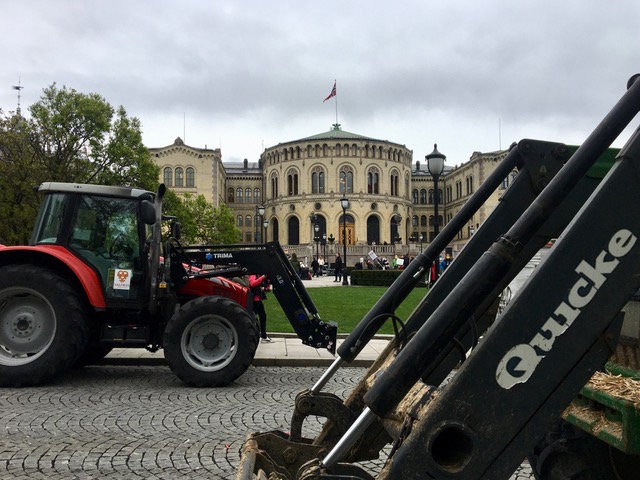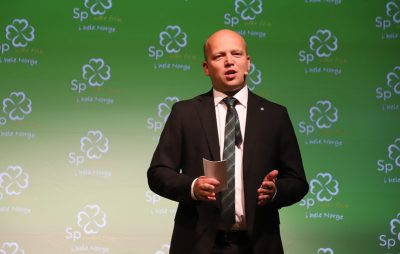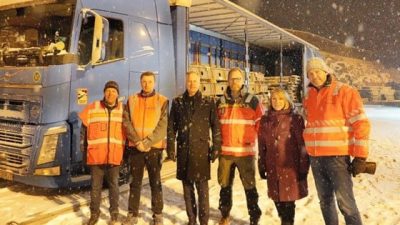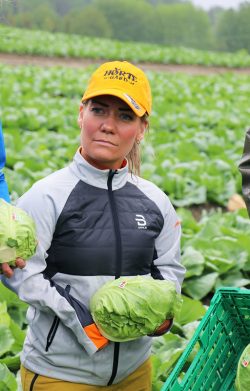NEWS ANALYSIS: Norway’s troubled Labour-Center government was busy promoting its support for Ukraine both at home and abroad this week. It has refused, though, to follow the US, the EU and the UK in giving Ukraine tariff relief on the war-torn country’s agricultural products. Critics view the refusal as an “embarrassing, disappointing” and even “shameful” example of Norwegian protectionism at its worst.

“I think it’s embarrassing that Norway is now the only country (among western allies) that isn’t willing to give Ukraine tariff relief,” Sveinung Rotevatn, a Member of Parliament and deputy leader of the Liberal Party, told newspaper Dagens Næringsliv (DN). He claims the Center Party’s goal of always putting Norwegian farmers’ interests ahead of both trade partners and consumers is what’s steering the government on the tariff issue, “not solidarity with Ukraine.”
The harsh assessment comes after it finally was confirmed this week that Norway is turning down Ukraine’s request to allow tariff-free import of all its exports for at least the next year. Norway’s most important allies (the US, all EU countries and the UK) dropped all tariffs on Ukrainian imports as early as last spring, to help boost Ukraine’s shattered economy. In June, reported DN earlier this autumn, Ukraine then asked the four non-EU countries organized in the European Free Trade Association (EFTA, including Norway, Switzerland, Iceland and Liechtenstein) to do the same.
More specifically, Ukraine wanted to “update” its own free trade agreement with EFTA, which already has eliminated tariffs on most everything except agriculture. Of the roughly NOK 700 million worth of Ukrainian exports sent to Norway last year, only NOK 40 million was still subject to tariffs, all of it food products that could compete with those produced by Norwegian farmers. The actual amount of money involved is thus relatively small, but important for Ukraine and its efforts to forge closer ties with the EU and its long-term hopes for EU membership.

Ukraine has long been among the world’s most important food producers, but it’s been struggling to export its products while also defending itself against Russia’s invasion and attacks on critical infrastructure. DN has reviewed the minutes of Ukraine’s meeting with EFTA in June and found that the organization itself seemed favourable towards dropping more import tariffs on products from Ukraine. Iceland had even already proposed removing all tariffs on all Ukrainian imports including food for the next year, and since has.
Only Norway resisted, according to DN, to the point that its EFTA colleagues complained that Norway also dragged out the process of responding to Ukraine’s request. In September, Norway reportedly made it clear that it wasn’t willing to remove tariffs on agricultural products, among Ukraine’s most important exports. Norway was warned against blocking a new meeting with Ukrainian officials, with Switzerand claiming that would send a bad signal and hurt EFTA’s reliability.
Norway stressed that it was helping Ukraine with both weapons and money and wouldn’t block a new meeting, but needed more time for “internal consultations” on agricultural tariffs in Oslo. The needed “consultations” within Norway’s minority government coalition are believed to have been between the Labour-run trade minstry and the Center-run agriculture ministry. They’d largely been kept under wraps until DN published its first story on the trade conflict with Ukraine in November.

By that time, frustration was high that Ukraine already had been kept waiting for six months since first approaching EFTA with its request for full tariff relief. It didn’t take long for opposition parties in the Norwegian Parliament to react from both ends of the political spectrum. Both the Conservative and Progress parties on the right, the Reds and Greens on the left and the Liberals in the middle criticized the government for not setting the Center Party’s constant efforts to protect Norwegian agriculture aside during wartime.
“It’s difficult to see any reason (for the delay) other than the Center Party’s farming interests,” MP Ine Eriksen Søreide, who served as both defense- and foreign minister for the former Conservatives-led government, told DN. “I don’t see this as reaching out a hand to Ukraine when other countries say ‘yes’ and we hesitate. This doesn’t involve large sums of money and would send an important signal.”
Several of Norway’s biggest newspapers have also lashed out at the government for refusing to quickly approve tariff relief for Ukraine. Aftenposten equated it to “nonsense” and criticized the Center Party for “refusing to tinker with the protection farmers enjoy through tariff walls.” Aftenposten accused the government of being smålig (petty) and noted that “not even a war can get the Center Party to shift its priorities. The interests of Norwegian farmers always weigh most heavily.”
DN itself editorialized that “Norway’s solidarity with Ukraine clearly has a limit, and that’s where Norwegian farmers, after just receiving the largest financial package of agricultural support ever, can land in a theoretical situation where Ukrainian farmers might be able to sell more of what they produce in Norway.” DN went on to call it “shameful that the Ukrainians must spend so much time” trying to convince Norway to drop its tariff wall like most other countries quickly did last spring.
Even newspaper Dagsavisen, usually sympathetic to the farmers, editorialized that it was “difficult to understand” the government’s position. The paper accused the government of displaying “a lack of solidarity” with Ukraine.

DN sources within the Center Party have admitted to fear over the consequences of any tariff removals on agricultural products that could allow cheaper butter or flour, for example, into Norway. Center Party officials worried such removal could set a precedent and pressure Norway into granting similar tariff relief to other countries in war. Halvard Ingebriftsen, a state secretary for Labour in the ministry handling business and trade issues, denied Norway was blocking meetings between Ukraine and EFTA as a whole. He claimed Ukraine’s request was still under evaluation by the Norwegian government, but added that “modernizing” free trade agreements “normally takes several years.”
Other opposition politicians including the Liberals’ leader Guri Melby kept grilling government leaders, while the Ukrainian Embassy in Oslo was actively making its case for Norwegian tariff relief. “Norway continues to be less open for Ukrainian exports that the EU countries,” it wrote in an email to DN in late November. The embassy has otherwise expressed gratitude for the billions worth of aid it has received from Norway. Now it has felt compelled to appeal to no less than five Norwegian government ministries, outlining “10 steps” that not only would help Ukraine in its defense of Russian attacks but also to help “restore peace in Europe.”
Even though military support is the first priority, Ukraine wrote that there’s a “strong need” to strengthen the Ukrainian economy and provide humanitarian assistance. Norway has responded to NATO’s call to send weapons, ammunition and other military equipment to Ukraine and has been helping to train soldiers, too. Norway also recently announced another billion kroner worth of assistance and this week announced deliveries of bridges that can be quickly erected to help replace those bombed in Ukraine.
But the Norwegian government wouldn’t go as far as granting tariff relief to Ukraine. The opposition ultimately forced the issue in Parliament this week by submitting a proposal that directly asked the government to remove all tariffs on Ukrainian exports. With the controversial help of its support party, the Socialist Left (SV), the minority government coalition was thus able to defeat the proposal on Tuesday. SV’s leader Audun Lysbakken claimed he couldn’t jeopardize recent state budget negotiations with the government by demanding tariff relief for Ukraine.
“This isn’t the biggest question when it comes to solidarity with Ukraine,” Lysbakken told DN, adding that there “are good reasons why Norway needs special tariff policy for our agriculture. The big solidarity contributions to Ukraine involve completely different things.” He also admitted that his party “can not and will not form any alternative majority (in Parliament) without the government parties (Labour and Center).”

Center Party politicians also then started speaking up to defend themselves. The party’s finance policy spokesperson Cato Brunvand Ellingsen claimed that critics were “shedding crocodile tears,” while its agriculture minister Sandra Borch claimed that it was too risky to lower Norway’s tariff protection.
“We want to support Ukraine,” she told DN, “but if we had opened the tariff-free door it could be demanding to lock it again. It could have considerable consequences for Norwegian grain production.” Her party colleague Anne Beathe Tvinnereim, who serves as Norway’s government minister in charge of foreign aid, stressed the importance of ensuring Norway’s own food production and security. Tvinnereim claimed Norwegian farmers’ interests hadn’t triumphed over the request from Ukraine, rather that Norway’s own food production and preparedness were most important.
Borch added that it’s “not necessary” for Ukraine to send grain to Norway anyway, while Tvinnereim argued that it’s more needed in African and Middle Eastern countries. It should also be noted that Norwegian tariffs on Ukrainian grain already are removed after Norwegian farmers have managed to sell all their own grain. Not just grain sales are at issue, though. The ongoing tariffs will also continue to block any exports of other Ukrainian products such as raspberries, honey, apple juice, meat, dairy products and eggs.
Center ended up scoring another victory for its protectionist policy, at a time when Norway also is subject to harsh criticism over how its gas industry is profiting on the war. Borch and Tvinnereim then revealed to DN that their government suddenly found an extra NOK 40 million in its otherwise tight budget to send to Ukraine’s agriculture sector. In addition to that consolation prize of sorts, Norway has financed transport of grain from Odessa to Yemen and Sudan.
Meanwhile, a former top SV politician and state secretary in the finance ministry, Roger Schjerva, is also unhappy over the refusal to give Ukraine tariff relief.
“I think it’s amazing that the government has no problem letting billions run out of the treasury for foreign aid and support for Ukraine,” he told DN, “but when it comes to a tiny hint of competition for Norwegian farmers, it’s completely impossible. It’s getting a bit embarrassing over how Norway is going its own way here, right when we hand out a Nobel Peace Prize to support those fighting for democracy and against Russia.”
Rotevatn of the Liberals put it more bluntly: Norwegian solidarity “isn’t stretching longer than to Norges Bondelag (the farmers’ national organization and biggest lobby group). This is so disappointing.”
NewsinEnglish.no/Nina Berglund

